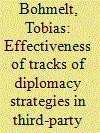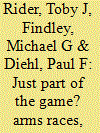| Srl | Item |
| 1 |
ID:
094695


|
|
|
|
|
| Publication |
2010.
|
| Summary/Abstract |
International mediation is not conducted solely by official actors such as states or international organizations. Non-official parties such as individuals and non-governmental organizations increasingly intervene as third-party mediators in conflicts. Both official and unofficial interventions are conceptualized as tracks of diplomacy (ToDs). Even though there is a vast quantitative literature on international mediation, most studies focusing on ToDs have been qualitative and produced few generalizable insights. This article extends the existing literature on third-party intervention by developing a theoretical model to explain the effectiveness of different ToDs, which is then empirically tested in a first large-N study. The findings indicate that the leverage and resources of ToDs determine outcome effectiveness. Track One Diplomacy, that is, efforts by official actors, tends to be the most effective form of intervention as greater leverage and more resources invested can make track intervention more effective. It is also found that combined mediation efforts of both official and unofficial tracks can be more effective than independent track actions. Since conflicts with mediation are unlikely to be a randomly selected set, a selection estimator is used to test the hypotheses on effectiveness. The empirical findings support the theory and demonstrate that the specific type of mediating actor seems highly important.
|
|
|
|
|
|
|
|
|
|
|
|
|
|
|
|
| 2 |
ID:
102511


|
|
|
|
|
| Publication |
2011.
|
| Summary/Abstract |
In this study, we look at the relationship of arms races to war, with appropriate consideration of rivalries. Are arms races more common in rivalries than in lesser competitions? Are they merely a consequence of rivalry competitions? How do the patterns of arms races map with those of war in rivalries? We explore these concerns with an empirical examination of rivalry and non-rivalry populations in the 1816-2000 period. In brief, we find that: arms races occur most frequently in the context of enduring rivalries; arms races are more likely in the middle and later stages of rivalry; the frequency of arms races is higher in rivalries with war than rivalries that do not experience war; and only when arms races occur in the later phases of rivalries is there an increased chance of war. Our study narrows the scope of the arms race-war relationship relative to past studies, demonstrating that the arms race-war relationship is conditional on rivalry processes.
|
|
|
|
|
|
|
|
|
|
|
|
|
|
|
|